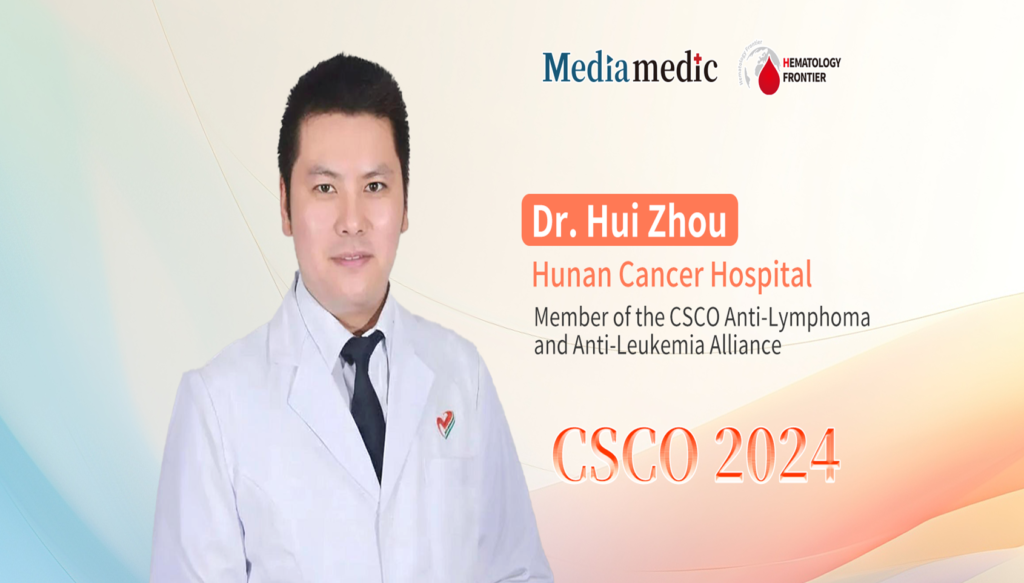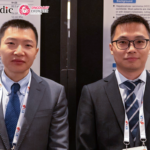
From September 25 to 29, 2024, the 27th Annual National Clinical Oncology Conference and 2024 CSCO Annual Meeting, hosted by the Chinese Society of Clinical Oncology (CSCO) and Beijing HopeRun Foundation, was held in Xiamen. With the theme of “Patient-Centered, Sharing the Future,” the event gathered leading research progress and developments in the field. Over the past two decades, CSCO has continuously led the development of clinical oncology in China, providing a platform for numerous experts to advance and grow. In response to CSCO’s call, Hematology Frontier has launched a column titled “Growing with CSCO” to reflect on history with Chinese scholars. In this edition, we invited Dr. Hui Zhou, a member of the CSCO Anti-Lymphoma and Anti-Leukemia Alliance and Director of the Lymphoma and Hematology Department at Hunan Cancer Hospital, to share his story of “Growing with CSCO” and discuss the latest advancements in marginal zone lymphoma (MZL).
Hematology Frontier: As a member of the CSCO Anti-Lymphoma and Anti-Leukemia Alliance, how do you view CSCO’s role in advancing oncology in China? Could you share your journey with CSCO and your recent experiences in participating in the annual meetings?
Dr. Hui Zhou: CSCO has been closely connected to my career trajectory since its establishment in 1997. At that time, I was still a university student, and after graduation, I entered the field of medical oncology, focusing on the diagnosis and treatment of solid lung tumors until 2017. In that year, I transitioned to become the head of the Lymphoma and Hematology Department, shifting my focus to the diagnosis and treatment of lymphoma and multiple myeloma.
In the early stages of my career in medical oncology, I served in the Secretariat of the Hunan Medical Oncology Committee, dedicated to promoting standardized chemotherapy treatment in the province. During this period, I witnessed CSCO’s rapid growth, especially in 2009 when CSCO held its first standardization lecture tour in Hunan Province, led by renowned experts such as Professor Shukui Qin and Professor Jun Ma, setting a benchmark for standardized oncology treatment in our province.
Since then, CSCO’s standardization concepts have been the core guidance in our work. After the career shift in 2017, I had the honor to join the CSCO Lymphoma Expert Committee in 2018 and became a member of the CSCO Leukemia Expert Committee in 2019. As the head of the Lymphoma and Hematology Department, I actively promoted CSCO’s lymphoma lecture tours in Hunan, organizing two sessions annually across Changsha and various other cities, making significant contributions to improving the province’s lymphoma diagnosis and treatment capabilities.
In recent years, Hunan Cancer Hospital’s capabilities in lymphoma diagnosis and treatment have significantly improved, thanks to the in-depth promotion and implementation of CSCO’s standardization concepts. With the refinement of these guidelines, patient numbers have notably increased, clinical drug trials have flourished, and patient survival times have been greatly extended. Today, the Lymphoma Department at Hunan Cancer Hospital has become a leading force in lymphoma treatment in the province, a testament to CSCO’s standardized approach.
Reflecting on CSCO’s 27-year journey, I feel deeply honored to have grown with it. During this period, the Lymphoma and Hematology Department at Hunan Cancer Hospital has also made great strides, earning the titles of Hunan Lymphoma Diagnosis and Treatment Center in 2019 and Hunan Hematologic Oncology Standardized Diagnosis and Treatment Base in 2020. Since 2021, we have also been recognized as a National Popular Science Education Demonstration Base for Lymphoma by the Chinese Anti-Cancer Association and a CSCO Standardized Diagnosis and Treatment Center for Lymphoma.
Moreover, we have established the Hunan Provincial Clinical Medical Research Center for Lymphoma, the Hunan Provincial Engineering Research Center for Precision Treatment of Lymphoma, and partnered with renowned cancer hospitals to create a regional sub-specialty alliance for lymphoma. Last year, we were awarded the National Lymphoma Quality Control Demonstration Center and the CSCO Standardized Lymphoma Diagnosis and Treatment Center, marking our entry into the national forefront in lymphoma treatment.
Therefore, as CSCO grows stronger, Hunan Cancer Hospital’s Lymphoma Department has also achieved significant development. In the future, we will continue to adhere to CSCO’s standardized treatment concepts and strive to contribute more to improving lymphoma treatment in China.
Hematology Frontier: In your lecture titled Standardization and Advances in the Diagnosis and Treatment of Marginal Zone Lymphoma (MZL) at this year’s CSCO conference, what do you see as the main challenges in the current state of MZL in China? Are there any new techniques or approaches being explored or applied to improve diagnostic accuracy and prognosis?
Dr. Hui Zhou: Marginal zone lymphoma is an indolent B-cell lymphoma originating from the marginal zones of follicles. Its disease course is typically long with indolent progression, often marked by repeated relapses. Given its diagnostic complexity, confirming MZL often requires close interdisciplinary collaboration. This collaborative network spans pathology, radiology, PET-CT, imaging, radiotherapy, and ultrasound and interventional diagnostics, all working together toward precise diagnosis and treatment.
Once a diagnosis is confirmed, a multidisciplinary consultation is conducted to combine expertise from various departments to formulate the most appropriate standardized treatment plan for the patient. However, the indolent nature of MZL and its potential for relapse pose significant challenges. With each recurrence, patients may face a progressive shortening of survival times, shorter intervals between relapses, and an increased risk of transformation into more aggressive phenotypes, further complicating and intensifying treatment.
Therefore, in treating MZL, the main difficulty lies in effectively addressing its relapse characteristics while balancing quality of life and maximizing survival. This requires constant exploration of innovative therapies, optimizing treatment strategies, and strengthening interdisciplinary communication and cooperation to offer patients more precise and effective treatment options.
Hematology Frontier: What new developments or innovative treatments have emerged in MZL management in recent years? What differences exist in treatment strategies for different subtypes, especially for relapsed/refractory MZL?
Dr. Hui Zhou: Treatment strategies for MZL must consider the indolent nature of the disease and the patients’ relatively long survival periods. Considering the different subtypes within the patient population, each with distinct etiologies and varied treatment responses, stratified therapy is crucial.
MZL mainly includes MALT lymphoma, nodal marginal zone lymphoma (NMZL), and splenic marginal zone lymphoma (SMZL). The latest WHO classification also includes rarer subtypes such as pediatric nodal marginal zone lymphoma (PNMZL) and primary cutaneous marginal zone lymphoma. For early-stage disease, the treatment approach should be differentiated: for patients with Helicobacter pylori-positive gastric MALT lymphoma, eradication therapy is the first choice, while for those who are H. pylori-negative or resistant to treatment, radiotherapy can be considered as an alternative. For early-stage splenic MZL, splenectomy is an effective treatment, while for early-stage NMZL, radiotherapy can be selected.
For patients with advanced-stage (III/IV) or progressive disease, treatment decisions should first assess the need for intervention. For patients with low tumor burden and no clear indication for treatment, observation or single-agent rituximab may be considered. For advanced-stage (III/IV) patients with high tumor burden and clear indications for treatment, immunochemotherapy remains the mainstay, with regimens such as BR, RCHOP, and RCVP. With the advancement of new drugs, regimens like R2 have shown good efficacy in indolent lymphomas, including MZL. However, attention should be given to rash and hematologic toxicity, particularly in elderly patients.
In addition, BTK inhibitors like orelabrutinib have shown good efficacy in relapsed/refractory MZL, confirmed by multicenter Phase II clinical trials with favorable complete response rates and safety profiles. It has been approved in China for this patient group, effectively reducing risks of bleeding, thrombosis, rash, and hematologic toxicity, enhancing treatment tolerability in elderly patients.
Looking forward, with the continued emergence of new therapies such as BTK inhibitors, PI3K inhibitors, BCL-2 inhibitors, novel anti-CD20 antibodies, and cellular therapies, more hope is on the horizon for patients with relapsed/refractory MZL to achieve long-term survival and significant benefits.
Dr. Hui Zhou
- Current Position: Director of Lymphoma and Hematology Department, Hunan Cancer Hospital
- Academic Qualifications: Ph.D. in Oncology, Professor, Chief Physician, and Master’s Supervisor
- Professional Titles and Roles: Chairman, Lymphoma Professional Committee, Hunan Anti-Cancer Association Director, Lymphoma Diagnosis and Treatment Center, Hunan Province Director, Engineering Research Center for Precision Diagnosis and Treatment of Lymphoma, Hunan Province Director, Clinical Medical Research Center for Lymphoma, Hunan Province Member, Lymphoma Group, Chinese Society of Clinical Oncology (CSCO) Member, Tumor Translational Medicine Group, Chinese Medical Association Oncology Branch Member, Oncology Division, Chinese Medical Promotion Association Standing Committee Member, Lymphoma Professional Committee, Chinese Anti-Cancer Association Incoming Chairman, Medical Oncology Professional Committee, Hunan Medical Association Member, CSCO Anti-Lymphoma Alliance Member, CSCO Anti-Leukemia Alliance Council Member, Youth Council of the Chinese Anti-Cancer Association
Dr. Hui Zhou is a leading expert in the field of hematologic malignancies, specializing in the diagnosis and treatment of lymphoma. His dedication and leadership have significantly contributed to the advancement of lymphoma care and research in Hunan Province.


